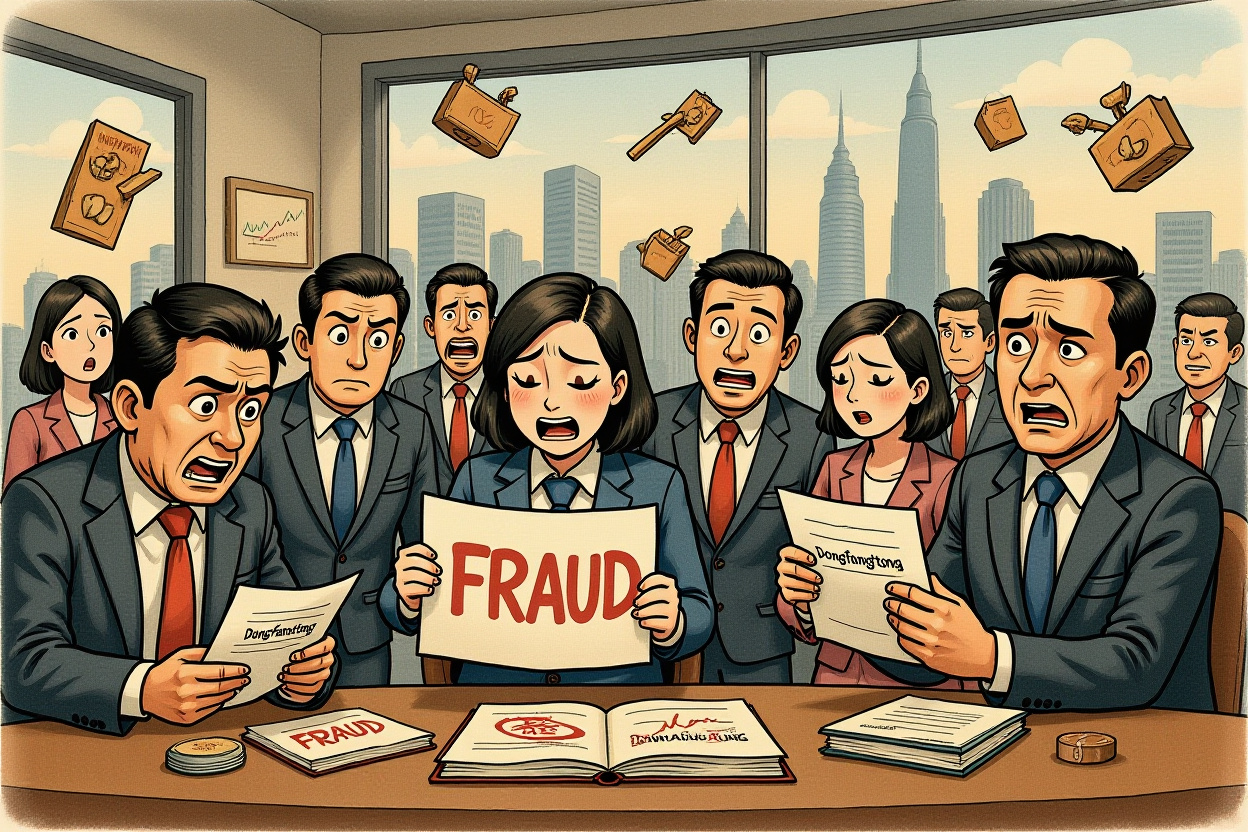In a landmark enforcement action, China’s securities regulator has uncovered one of the most significant financial fraud cases in recent years involving Beijing Dongfangtong Technology Co., a once-prominent middleware and cybersecurity provider. The China Securities Regulatory Commission (CSRC) has proposed a staggering 229 million yuan ($32 million) fine against the company after discovering systematic accounting manipulations spanning four consecutive years. This case represents the latest chapter in China’s ongoing crackdown on financial misconduct and sends a clear message about the consequences of securities law violations. The developments at Dongfangtong financial fraud case highlight the regulatory commitment to market integrity and investor protection. The company now faces mandatory delisting from the Shenzhen Stock Exchange, potentially wiping out billions in market value and leaving shareholders with substantial losses. This case emerges amid China’s broader efforts to clean up its capital markets and improve corporate governance standards, particularly among technology companies that have enjoyed rapid growth and high valuations in recent years. The Dongfangtong financial fraud investigation demonstrates regulators’ increasing sophistication in detecting complex accounting schemes and their willingness to impose severe penalties on violators. The case has sent shockwaves through China’s technology sector, where Dongfangtong was previously regarded as a national champion in middleware and cybersecurity solutions. Investors are now questioning how such extensive fraud could have gone undetected for so long at a company that claimed to maintain robust internal controls and compliance systems. The Dongfangtong financial fraud scheme involved sophisticated methods to overstate revenue and profits, according to regulatory findings. The company allegedly created fictitious transactions, manipulated contract values, and recognized revenue prematurely to meet performance targets and maintain its listing status. These practices artificially inflated the company’s financial health, misleading investors and analysts who relied on the reported numbers for investment decisions. The scale of the deception suggests possible collusion between management and potentially other parties, raising questions about oversight failures at multiple levels. The CSRC’s investigation into Dongfangtong financial fraud revealed that the company had been systematically falsifying its financial statements since at least 2018. The regulatory probe found evidence of fabricated sales contracts, circular transactions with related parties disguised as arm’s length deals, and improper revenue recognition practices that violated both Chinese accounting standards and securities regulations. The consistent pattern of manipulation indicates this was not an isolated error but rather a coordinated effort to present a false picture of the company’s performance to the market. The duration of the Dongfangtong financial fraud scheme is particularly alarming to regulators, as it suggests the company’s internal controls were either completely bypassed or deliberately disabled. Normally, public companies are required to maintain systems that prevent and detect financial misstatements, including segregation of duties, authorization controls, and regular internal audits. The fact that the fraud continued for four years without being caught by internal mechanisms points to serious governance deficiencies and possible collusion at senior levels of the organization.
Regulatory Response and Penalties
The China Securities Regulatory Commission has taken an exceptionally firm stance on the Dongfangtong financial fraud case, proposing one of the largest fines in recent memory for securities violations. The 229 million yuan penalty against the company represents a significant portion of its market capitalization and sends a strong deterrent message to other listed firms contemplating similar misconduct. Beyond the corporate fine, regulators have targeted individual executives and controllers who allegedly orchestrated or permitted the accounting manipulations.
Individual Accountability Measures
The CSRC has proposed substantial penalties against seven company officials totaling 44 million yuan, with the actual controller facing a decade-long ban from securities markets. This personal liability approach reflects regulators’ growing emphasis on holding individuals, not just corporations, responsible for financial fraud. The decade-long market ban for the controller is particularly noteworthy, as it effectively removes a key decision-maker from participating in China’s capital markets for an extended period. Such individual sanctions are becoming more common in Chinese enforcement actions as regulators seek to create meaningful personal consequences for executive misconduct. The regulatory response to Dongfangtong financial fraud includes not just financial penalties but also reputational damage and operational restrictions that could effectively end the company’s existence as a publicly-traded entity. The forced delisting process, once initiated, typically provides limited opportunities for appeal and almost inevitably leads to the company’s removal from the exchange. This represents the ultimate sanction in securities regulation – the loss of listing privileges and access to public capital markets.
Market Impact and Investor Consequences
The revelation of Dongfangtong financial fraud has already triggered massive value destruction for shareholders, with the stock plummeting more than 56% year-to-date to reach a market capitalization of approximately 3.67 billion yuan. This dramatic decline reflects both the specific fraud-related revelations and broader concerns about governance quality in China’s technology sector. Retail investors, who often comprise a significant portion of shareholders in Chinese listed companies, have borne the brunt of these losses, highlighting the human cost of financial misconduct. The Dongfangtong financial fraud case has broader implications for market confidence in Chinese technology stocks, particularly those in the cybersecurity and software sectors where Dongfangtong operated. Investors may now apply additional scrutiny to companies with similar business models or growth patterns, potentially increasing the cost of capital for legitimate operators in the space. The case also raises questions about the effectiveness of auditing and due diligence processes, as external auditors apparently failed to detect the multi-year fraud despite their mandate to provide reasonable assurance about financial statement accuracy. The trading suspension and impending delisting process create additional complications for current shareholders. Typically, once a delisting procedure begins, trading is halted for extended periods, trapping investors who cannot exit their positions. If the company is ultimately delisted, shareholders may be forced to hold illiquid shares in an over-the-counter market or face near-total loss of their investment. This scenario underscores the importance of diversification and thorough fundamental analysis when investing in individual stocks, particularly in emerging markets where corporate governance standards may vary widely.
Broader Implications for China’s Financial Markets
The Dongfangtong financial fraud case occurs against the backdrop of China’s ongoing efforts to improve market transparency and strengthen investor protections. In recent years, Chinese regulators have increasingly prioritized securities law enforcement as part of broader financial market reforms. This case demonstrates both the progress made in detection capabilities and the persistent challenges in preventing sophisticated financial fraud. The CSRC’s handling of the Dongfangtong financial fraud investigation suggests a more aggressive approach to enforcement than in previous years. Regulators appear willing to pursue maximum penalties and pursue delisting in appropriate cases, moving beyond the symbolic fines that sometimes characterized earlier enforcement actions. This tougher stance aligns with China’s ambitions to develop mature, trustworthy capital markets that can allocate resources efficiently and support economic growth.
Regulatory Evolution and Challenges
China’s securities regulators have significantly enhanced their surveillance and investigation capabilities in recent years, employing advanced data analytics and artificial intelligence to detect suspicious patterns across thousands of listed companies. The identification of the Dongfangtong financial fraud scheme likely benefited from these technological improvements, which allow regulators to cross-reference multiple data sources and identify inconsistencies that might escape manual review. However, the case also highlights the ongoing challenges regulators face in preventing fraud before it causes significant investor harm. Despite technological advances, determined fraudsters can still devise schemes that evade detection for extended periods, particularly when multiple parties collude to conceal the misconduct. This reality underscores the importance of complementary measures such as whistleblower protections, auditor independence requirements, and robust corporate governance standards that create multiple layers of defense against financial fraud. The Dongfangtong financial fraud case may accelerate regulatory reforms already underway in China’s capital markets. Authorities have been gradually implementing a registration-based system for IPOs that shifts more responsibility to investors for conducting due diligence while strengthening ongoing disclosure requirements for listed companies. Cases like Dongfangtong’s provide impetus for further strengthening these reforms and ensuring that market participants face appropriate consequences for misconduct.
Industry-Specific Implications
The fallout from the Dongfangtong financial fraud scandal extends beyond the company itself to affect the broader middleware and cybersecurity industry in China. As a self-described pioneer and leader in middleware technology, Dongfangtong’s disgrace may create opportunities for competitors but also raises questions about industry practices more broadly. Clients who relied on Dongfangtong’s products and services may now reconsider their procurement decisions, potentially shifting business to competing providers. The case may also impact how investors value technology companies in similar sectors. Previously, investors might have focused primarily on growth metrics and technological capabilities when evaluating software and cybersecurity firms. The Dongfangtong financial fraud case underscores the importance of also scrutinizing governance quality, internal controls, and financial reporting integrity. Companies with transparent accounting and strong oversight mechanisms may benefit from a flight to quality, while those with governance concerns could face increased skepticism from investors. For employees of Dongfangtong, the fraud revelations and impending delisting create significant uncertainty about job security and career prospects. The company’s ability to retain talent and continue operations may be severely compromised by the reputational damage and financial penalties. This human dimension of the scandal reminds us that financial misconduct ultimately affects real people – not just abstract corporate entities and shareholder value.
Lessons for Investors and Market Participants
The Dongfangtong financial fraud case offers several important lessons for investors operating in Chinese and global markets. First, it underscores that apparently successful companies with strong market positions can still engage in significant misconduct. Reputation and industry standing are not reliable substitutes for thorough due diligence and ongoing monitoring of investments. Second, the case highlights the importance of paying attention to red flags in financial statements, such as: – Consistent earnings that barely meet or exceed analyst expectations – Complex revenue recognition policies that differ significantly from industry norms – Unexplained changes in accounting practices or auditors – Significant related-party transactions that lack clear business purpose – Growing discrepancies between reported financial results and operational metrics Third, the Dongfangtong financial fraud case demonstrates the critical role of independent directors and audit committees in providing oversight. Investors should scrutinize the composition and effectiveness of these governance mechanisms when evaluating companies for investment. Boards with truly independent directors who possess relevant financial expertise are more likely to provide effective challenge to management and prevent financial misconduct. Finally, the case reminds investors of the importance of diversification. Even with thorough research, unexpected events like major fraud revelations can devastate individual stock investments. Maintaining a appropriately diversified portfolio remains one of the most reliable ways to manage company-specific risks, including the risk of undetected financial fraud. The Dongfangtong financial fraud case represents a significant moment in China’s ongoing efforts to build transparent, trustworthy capital markets. While the immediate consequences are severe for the company and its stakeholders, the rigorous regulatory response may ultimately strengthen market integrity and investor confidence. As China continues to develop its financial markets and integrate with global capital flows, such enforcement actions demonstrate commitment to international standards of securities regulation and corporate governance. For market participants, the case serves as a stark reminder that financial fraud eventually surfaces, and the consequences can be catastrophic for those involved. Investors should remain vigilant in their analysis of company financials and governance practices, while companies should recognize that short-term gains from misconduct are far outweighed by the long-term costs of lost trust and regulatory sanctions. The path to sustainable value creation lies in transparency, integrity, and compliance – principles that ultimately benefit companies, investors, and markets alike.




